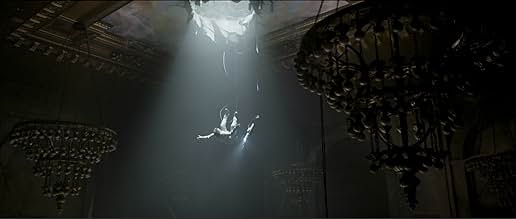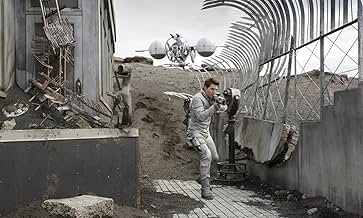Ein Veteran, der beauftragt ist, die verbleibenden Ressourcen der Erde zu gewinnen, beginnt, sich zu fragen, was er über seine Mission und sich selbst weiß.Ein Veteran, der beauftragt ist, die verbleibenden Ressourcen der Erde zu gewinnen, beginnt, sich zu fragen, was er über seine Mission und sich selbst weiß.Ein Veteran, der beauftragt ist, die verbleibenden Ressourcen der Erde zu gewinnen, beginnt, sich zu fragen, was er über seine Mission und sich selbst weiß.
- Regie
- Drehbuch
- Hauptbesetzung
- Auszeichnungen
- 1 Gewinn & 17 Nominierungen insgesamt
David Benyena
- Grow Hall Survivor
- (as David Madison)
John L. Armijo
- NASA Ground Control
- (Nicht genannt)
Fileena Bahris
- Survivor
- (Nicht genannt)
Joanne Bahris
- Tourist
- (Nicht genannt)
Andrew Breland
- Survivor
- (Nicht genannt)
Suri Cruise
- Jack's Daughter
- (Nicht genannt)
Z. Dieterich
- Survivor
- (Nicht genannt)
Paul Gunawan
- Survivor
- (Nicht genannt)
Julie Hardin
- Librarian
- (Nicht genannt)
Empfohlene Bewertungen
Primarily a tale of disinformation, "Oblivion" tackles myriad issues that are relevant to our time: Do you know who you are? Who do you trust to inform you? What is true intimacy? And will Artificial Intelligence rule over mankind? To be frank, the true great villain in "Oblivion" is the human race itself: We are enslaving our own people, destroying our own planet and exterminating each other. But, to be even more precise, the true villains are the people in wealth and power (as portrayed here by sentient artificial intelligence). The millionaires and politicians are the ones who pay to keep us in the dark and on our hamster wheels, feeding them resources at the cost of all life on the surface of the Earth. In our reality, just like in the movie, mankind is engaged in repetitive tasks, staying alive and oblivious to its truth; living in superficial relationships with no real love and allowing the planet to be consumed. As such, you and I ARE the protagonist in this movie: A puppet on strings, fighting against itself and serving an evil, selfish and vampiric power that is corrupting the planet. We are living in the clouds and need to touch grass.
To get the plastic point across, Director Joseph Kosinski employs wonderful vistas of our planet. The photography and prop design in this movie is truly something special (thank you, Claudio Miranda). The color palette also gets the plot across by driving in the difference between conscious and unconscious, earthly and artificial thru black, brown and green versus cream and grey. Thru an exaggerated script, (one which can be frustrating, especially during the first minutes of the film), we see that the ideal life our repairman leads is both luxurious and supposedly meaningful... but something is afoot; it doesn't feel natural! Our protagonist has been fed false information, the same way we are told whatever suits the agenda of today's media outlets. We notice in the movie that those who cannot accept the truth, refuse to engage with the planet; they live in the sky and are not "down to Earth". These people exist in real life, and can usually be found in wealthy circles who are far removed from any struggle, conflict or life difficulty. Because of this, they perceive others as inhuman or below them, when the truth is the exact opposite.
In conclusion, whether it was Joseph Kosinski's intention or not, "Oblivion" asks you to wake up and realize: You are overseeing the destruction of your human soul and are participating in the looting of planet Earth. But what do you do now? The film offers no other solution to this issue of the machine, other than to join a Jihad and bomb the system to kingdom come. As such, "Oblivion" may strike some users into consideration, but mostly passes off as a good time and is quickly forgotten in a sea of other consumables.
To get the plastic point across, Director Joseph Kosinski employs wonderful vistas of our planet. The photography and prop design in this movie is truly something special (thank you, Claudio Miranda). The color palette also gets the plot across by driving in the difference between conscious and unconscious, earthly and artificial thru black, brown and green versus cream and grey. Thru an exaggerated script, (one which can be frustrating, especially during the first minutes of the film), we see that the ideal life our repairman leads is both luxurious and supposedly meaningful... but something is afoot; it doesn't feel natural! Our protagonist has been fed false information, the same way we are told whatever suits the agenda of today's media outlets. We notice in the movie that those who cannot accept the truth, refuse to engage with the planet; they live in the sky and are not "down to Earth". These people exist in real life, and can usually be found in wealthy circles who are far removed from any struggle, conflict or life difficulty. Because of this, they perceive others as inhuman or below them, when the truth is the exact opposite.
In conclusion, whether it was Joseph Kosinski's intention or not, "Oblivion" asks you to wake up and realize: You are overseeing the destruction of your human soul and are participating in the looting of planet Earth. But what do you do now? The film offers no other solution to this issue of the machine, other than to join a Jihad and bomb the system to kingdom come. As such, "Oblivion" may strike some users into consideration, but mostly passes off as a good time and is quickly forgotten in a sea of other consumables.
For decades it has been an accepted fact of life in Hollywood that, no matter how good the movie, endings are a write-off.
Hollywood has learned the hard way that, no matter how good the film (or the book on which it is based) it is impossible to do an ending which satisfies the writer, the director, the producers, the critics, the audience and (duh!) reviewers like this one.
That is why, for literally as long as there have been movies, endings are changed at the last minute; and often even multiple endings are shot so that survey groups can be brought in to make the final choice.
The reason I gave this brief lecture on the importance of endings is simple -- going into the last 20 minutes, this was a rock solid film with a rock solid script and rock solid performances.
But the ending was ... perfect.
And perfect endings are so rare these days that I needed to write a review for posterity that does nothing except note this for future readers and future viewers.
Are we still an effective team???????????
Hollywood has learned the hard way that, no matter how good the film (or the book on which it is based) it is impossible to do an ending which satisfies the writer, the director, the producers, the critics, the audience and (duh!) reviewers like this one.
That is why, for literally as long as there have been movies, endings are changed at the last minute; and often even multiple endings are shot so that survey groups can be brought in to make the final choice.
The reason I gave this brief lecture on the importance of endings is simple -- going into the last 20 minutes, this was a rock solid film with a rock solid script and rock solid performances.
But the ending was ... perfect.
And perfect endings are so rare these days that I needed to write a review for posterity that does nothing except note this for future readers and future viewers.
Are we still an effective team???????????
The trivia tells us that this is based on a comic book that director joseph kosinski wrote in 2005 but was never published. The story takes place in 2077, just after the "memory wipe" that jack (cruise) describes for us. And the invasion by space travelers, which destroyed most of the cities and made living on the surface mostly impossible. Some great special effets. The control panels, the copter, even the wrecked surface of the planet. Jack is tasked with protecting the structures that support the floating living quarters for the remaining population. I LOVE the mini moto that jack rides around on... kind of like a george jetson briefcase that folds and unfolds. Google it. Some beautiful scenery of iceland, and various film locs in the united states. When another human from the past crash lands, we're not sure what her mission is, or who's side she is on. Some really good suspense, while we wait for answers. Especially when morgan freeman is involved. Really good sci-fi stuff!
This movie is - without a doubt - one of the most visually spectacular that I have ever seen, standing shoulder-to-shoulder in that department with the likes of Watchmen, Prometheus, Sunshine and Kosinski's preceding effort - TRON: Legacy. Also (like TRON) the soundtrack is excellent and very well used throughout, enhancing the action and adding depth to some - at times - distinctly average acting performances.
Tom Cruise plays Tom Cruise but that's not a bad thing in this case, in fact his natural charisma carries the movie through some of its slower sections. Morgan Freeman plays Morgan Freeman though he's really not on screen for long enough to influence the movie one way or another. Olga Kurylenko's statuesque profile is unfortunately not matched by her acting ability and I often found it difficult to believe in her character's actions and emotions. Andrea Riseborough turns in maybe the best performance, convincing as the sad and confused Victoria, unwilling - or perhaps unable - to confront the disturbing truth.
At over 2 hours I think that it's too long by about 20 minutes. A shorter cut would tighten up the story and eliminate some of the slower sections which I think hurt the movie's overall rhythm and flow.
Overall, I would definitely recommend going to see this movie in the cinema, on the biggest screen that you can find. It just won't be the same on TV. The visual appeal alone is reason enough, but combined with a clever (if not entirely original) script, a thumping soundtrack and some exciting action, you should be entertained.
Tom Cruise plays Tom Cruise but that's not a bad thing in this case, in fact his natural charisma carries the movie through some of its slower sections. Morgan Freeman plays Morgan Freeman though he's really not on screen for long enough to influence the movie one way or another. Olga Kurylenko's statuesque profile is unfortunately not matched by her acting ability and I often found it difficult to believe in her character's actions and emotions. Andrea Riseborough turns in maybe the best performance, convincing as the sad and confused Victoria, unwilling - or perhaps unable - to confront the disturbing truth.
At over 2 hours I think that it's too long by about 20 minutes. A shorter cut would tighten up the story and eliminate some of the slower sections which I think hurt the movie's overall rhythm and flow.
Overall, I would definitely recommend going to see this movie in the cinema, on the biggest screen that you can find. It just won't be the same on TV. The visual appeal alone is reason enough, but combined with a clever (if not entirely original) script, a thumping soundtrack and some exciting action, you should be entertained.
A provocative story kernel in its own right, yet it pulls fragments from too many genre greats making it a clichéd mosaic pastiche of a post apocalyptic world where everything is not as it seems.
The opening third is intriguing and well played with a strong three-way dynamic between Jack, Victoria and their mysterious video-comm handler; it piques interest and poses many questions. Jack's questioning nature and feeling that something is 'off' contrasts with the 'happy clappy', following orders vibe from Victoria.
This dynamic is enhanced with the addition of a fourth character Julia, who is already in Jack's dreams - a fabulous performance from Olga Kurylenko. From there though, the movie loses its charm and becomes completely generic.
Fabulous cinematography uses distinct color palettes to denote time and location, admirably supported by excellent effects. The soundtrack is also strong with carefully selected music.
Overall this is a good watch, but flatters to deceive. With more self-confident writing this could have become a classic.
The opening third is intriguing and well played with a strong three-way dynamic between Jack, Victoria and their mysterious video-comm handler; it piques interest and poses many questions. Jack's questioning nature and feeling that something is 'off' contrasts with the 'happy clappy', following orders vibe from Victoria.
This dynamic is enhanced with the addition of a fourth character Julia, who is already in Jack's dreams - a fabulous performance from Olga Kurylenko. From there though, the movie loses its charm and becomes completely generic.
Fabulous cinematography uses distinct color palettes to denote time and location, admirably supported by excellent effects. The soundtrack is also strong with carefully selected music.
Overall this is a good watch, but flatters to deceive. With more self-confident writing this could have become a classic.
Wusstest du schon
- WissenswertesThere were ten days of location shooting in Iceland, where daylight lasted virtually 24 hours. Joseph Kosinski wanted to make a film that was very much based in daylight, considering that a lot of classic sci-fi movies like Alien: Das unheimliche Wesen aus einer fremden Welt (1979) and Der Blade Runner (1982) were shot in near darkness.
- PatzerShortly before the end of the film, Jack listens to the contents of the black box which he found in the crashed crew module with the hibernating "Odyssey" crew members. The recorded cockpit conversation between Victoria and Jack goes on after sealing off the module with other crew members and even continues after jettison of the module. At first glance it seems the cockpit conversation could no longer be on the black box, but the system could have been transmitting the recorded conversation to the crew module with the black box.
- Zitate
Jack Harper: If we have souls, they are made of the love we share... undimmed by time and bound by death.
- Crazy CreditsThe Universal logo features the Earth in its ruined state in 2077 in the film, with the logo's letters rusted.
The Tet space station is seen orbiting the world.
- Alternative VersionenThe film's IMAX release presented the film open-matte, at an aspect ratio of 1.90:1, meaning there was more picture information visible in the top and bottom of the frame than in normal theaters and on home video.
- VerbindungenFeatured in Projector: Oblivion (2013)
- SoundtracksRamble On
Written by Robert Plant, Jimmy Page
Performed by Led Zeppelin
Courtesy of Atlantic Recording Corp.
By arrangement with Warner Music Group Film & TV Licensing
Top-Auswahl
Melde dich zum Bewerten an und greife auf die Watchlist für personalisierte Empfehlungen zu.
- How long is Oblivion?Powered by Alexa
- What is the purpose of all those random noises that the drones make? Is it a form of communication?
- Is Oblivion based on a book?
- Why did the Tet need Earth's seawater?
Details
- Erscheinungsdatum
- Herkunftsland
- Offizielle Standorte
- Sprache
- Auch bekannt als
- Oblivion: El tiempo del olvido
- Drehorte
- Produktionsfirmen
- Weitere beteiligte Unternehmen bei IMDbPro anzeigen
Box Office
- Budget
- 120.000.000 $ (geschätzt)
- Bruttoertrag in den USA und Kanada
- 89.107.235 $
- Eröffnungswochenende in den USA und in Kanada
- 37.054.485 $
- 21. Apr. 2013
- Weltweiter Bruttoertrag
- 286.168.572 $
- Laufzeit2 Stunden 4 Minuten
- Farbe
- Sound-Mix
- Seitenverhältnis
- 2.39 : 1
Zu dieser Seite beitragen
Bearbeitung vorschlagen oder fehlenden Inhalt hinzufügen



































